The central issue in the labor reforms is the unions' refusal agree reforms to allow individual firms more freedom to negotiate working conditions without referring upwards to branch-level agreements. The unions say this will weaken workers' powers, but the French Government say it will give grassroots workers a bigger say in the workplace.
#France: Barricades in Lille set against labor law #LoiTravail. 8 unionists detained by police. #manif28juin https://t.co/MOhkufLVxX
— ѕyndιcalιѕт (@syndicalisms) 28 June 2016
France has been hit with a series of strikes and mass demonstrations since March, bringing chaos to the rail network, the Paris Metro and airlines, as well as road transport, because of industrial action and blockades at fuel refineries and depots.
Worker's Rights
Principally, the protests are against reforms to the highly codified French labor laws — known as the Code du travail — in order to give employers more flexibility.
The labor reforms were largely directed at making companies take on more workers on permanent contracts, rather than temporary ones, to bring down the unemployment rate from ten percent. The proposals would give employers more scope to lay-off workers and cut costs and allow some employees to work far longer than the current 35-hour week.
#manif23juin #LoiTravail > Kim Jong #hollande pic.twitter.com/hYCCEhhhxh
— Mathilde Sagaire (@MathildeSagaire) 23 June 2016
The reforms were pushed through by Hollande, who invoked a little used piece of the constitution — article 49.3 — to bypass the upper house — the Senate — which is dominated by Republicans, who are against the reforms. The Senate has amended the text, but it now need to go back to the National Assembly.
However, opinion polls show that, while four out of five, disagree with the labor reforms, there is dwindling support for the industrial action — particularly with the eyes of the world on France, which is hosting the current Euro 2016 football tournament.
France 24 reported that only 4.5 percent of employees at state-owned national rail company SNCF were on strike Monday (June 13) — which is significantly smaller than previously.




